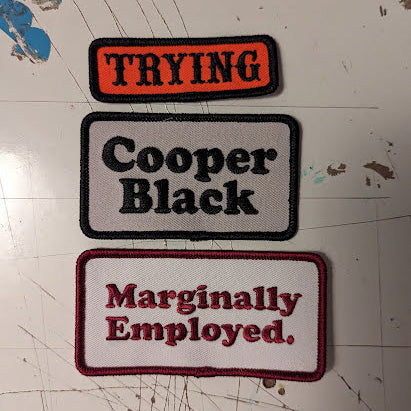
A Patch Three Pack
$20
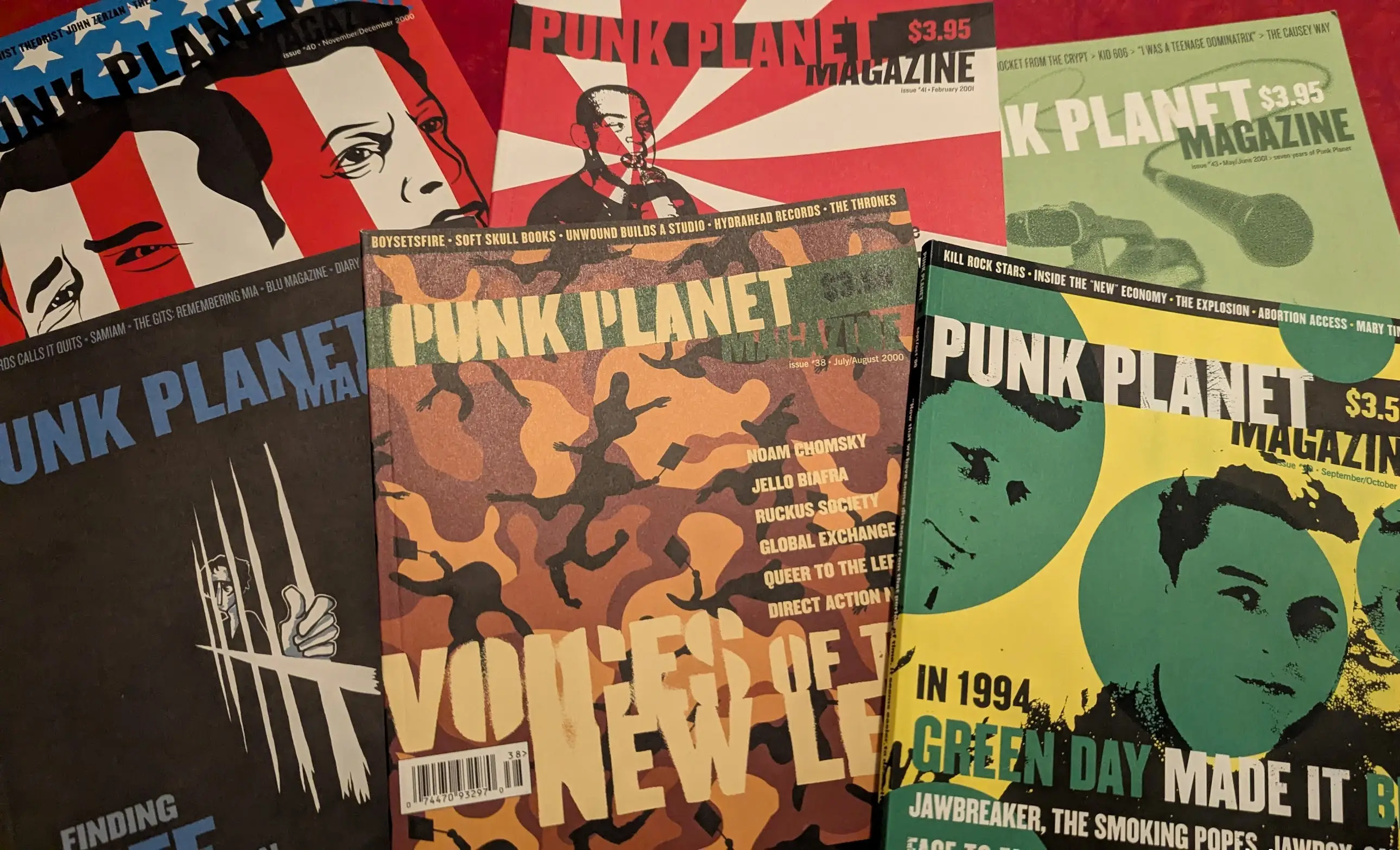
Punk Planet Year Seven, issues 38-43.
2024 marked 30 years since the start of Punk Planet, the magazine I ran for 13 years. To commemorate that milestone, I wrote 13 posts over 13 months, each one about a single year of the magazine. A year of learning, a year of trying, a year of making something impossible possible.
Read: Year One | Year Two | Year Three | Year Four | Year Five | Year Six | Year Seven | Year Eight | Year Nine | Year Ten | Year Eleven | Year Twelve | Year Thirteen
Over the course of my last few Punk Planet essays I feel like I've focused in on a repeating pattern: consistency. At this point in the magazine's life (now just crossing the halfway point) there's a team of regular contributors bringing their A game every two months, a team of designers pushing each other to create beautiful pages, and a critical mass of an audience who were looking for the consistency we were bringing issue after issue.
And so yes, I could write about the continued push toward radical politics the magazine took (out of the six issues in Year Seven, only two featured music cover stories), or the evolution of the look and feel of the magazine (I'm particularly happy with issues 38 and 41's covers, which feel very iconic in very different ways), or I could talk at length about the swagger that it took to produce issue 39's cover story, Kyle Ryan's "The Crash," a twenty two page article about all the bands that signed to major labels after Green Day that didn't make it big. All of this is a result of the incredible consistency Punk Planet was producing at in 2000 & 2001. But I'm not going to write about all that.
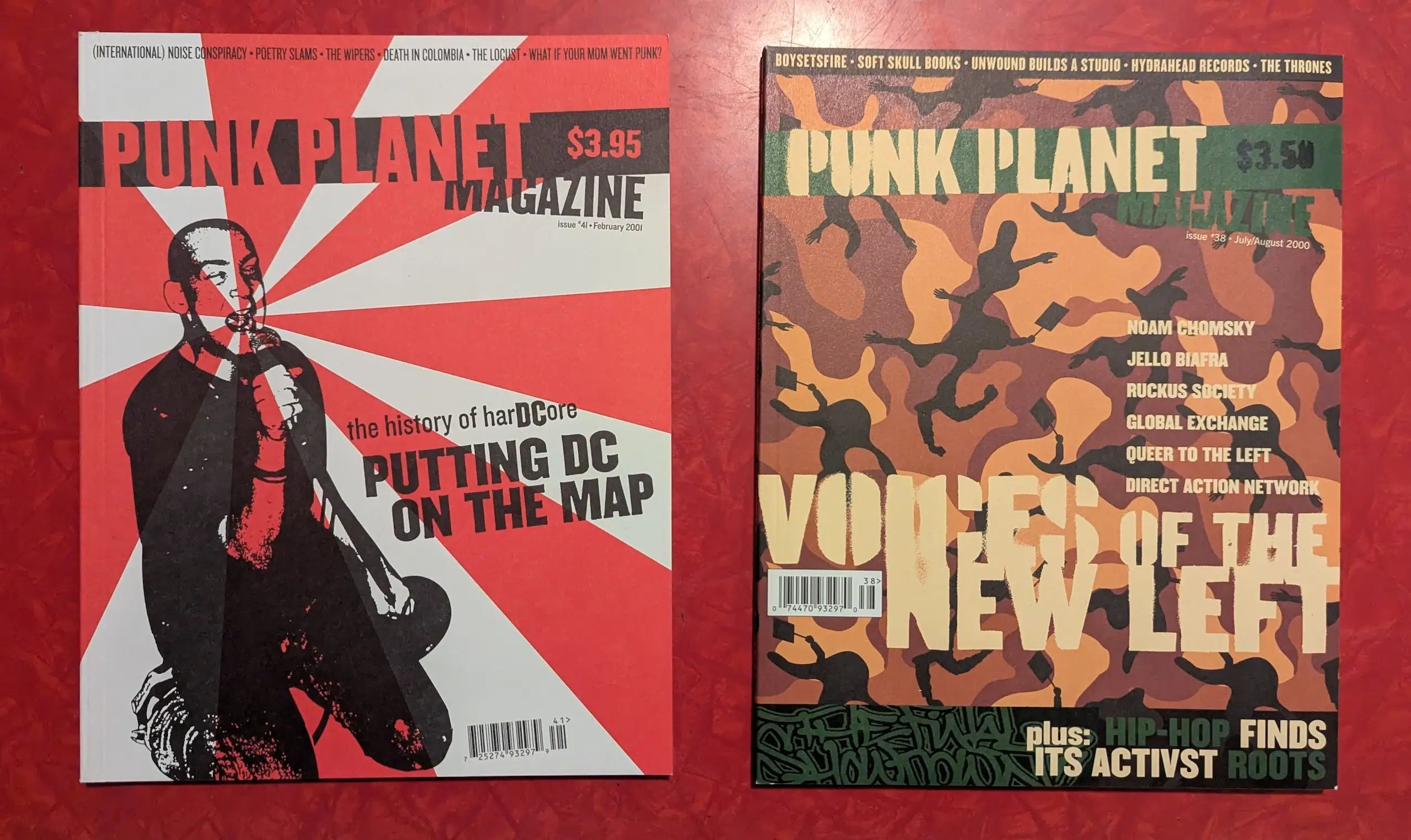
I love the covers for issue 38, about the history of DC punk, and 41 with its beautiful camouflage cover, illustrated by Paul Chan, my collaborator on the Become the Media issue.
Instead I want to talk about the final issue in Year Seven's run, issue 43, from May/June 2001. Its cover hyped an entire 36 page section we called "Become the Media: A Reference Guide to a Revolution."
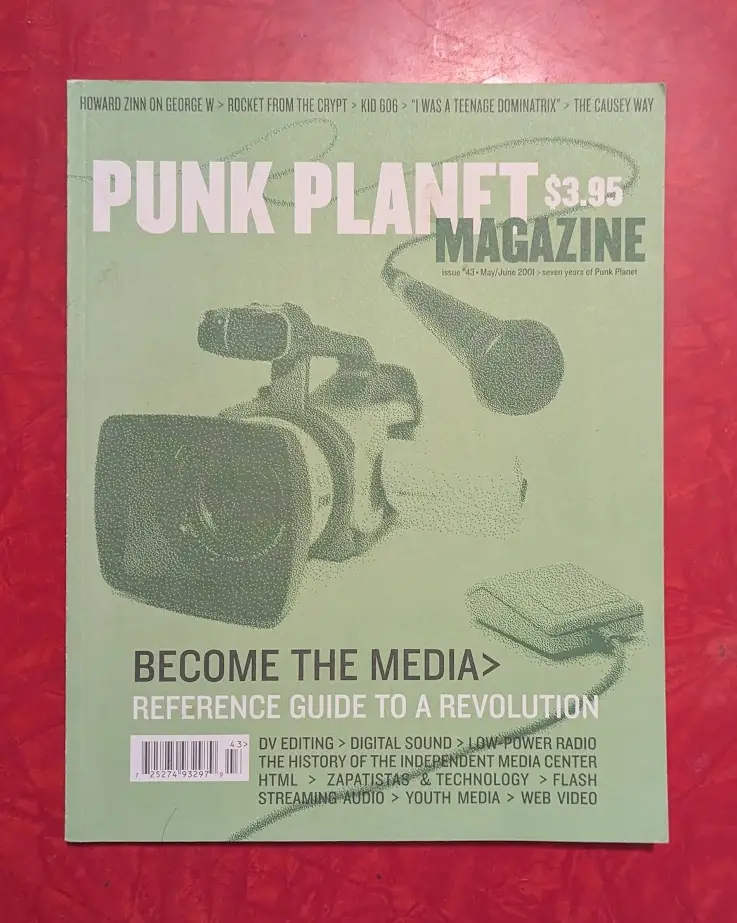
PP43, the "Become the Media" issue.
More than six months in the making, "Become the Media" was a collaboration between myself and frequent PP contributor Paul Chan and combined two of my favorite parts of Punk Planet—our ongoing coverage of underground mediamakers and the "DIY Files," how-tos we published every issue—into one juggernaut of a section. "Become the Media" not only offered detailed instructions on how to get started on what at the time were the latest digital technologies (most notably digital video & audio, HTML, and the now completely-outdated Flash), but also interviews and articles about the Independent Media Center, the radical media network that grew out of the 1999 WTO protests, a historical interview about 1960s media activists Newsreel, an article about how independent video production was giving youth of color an opportunity to counter mainstream media narratives about them, a look at how the Zapatistas used digital tech to get their message out from the jungles of Chiapas, and a conversation with free software activists who powered Indymedia. It was a potent combination that placed detailed instructions on how to do a thing right next to stories of people using that same thing in transformative ways.
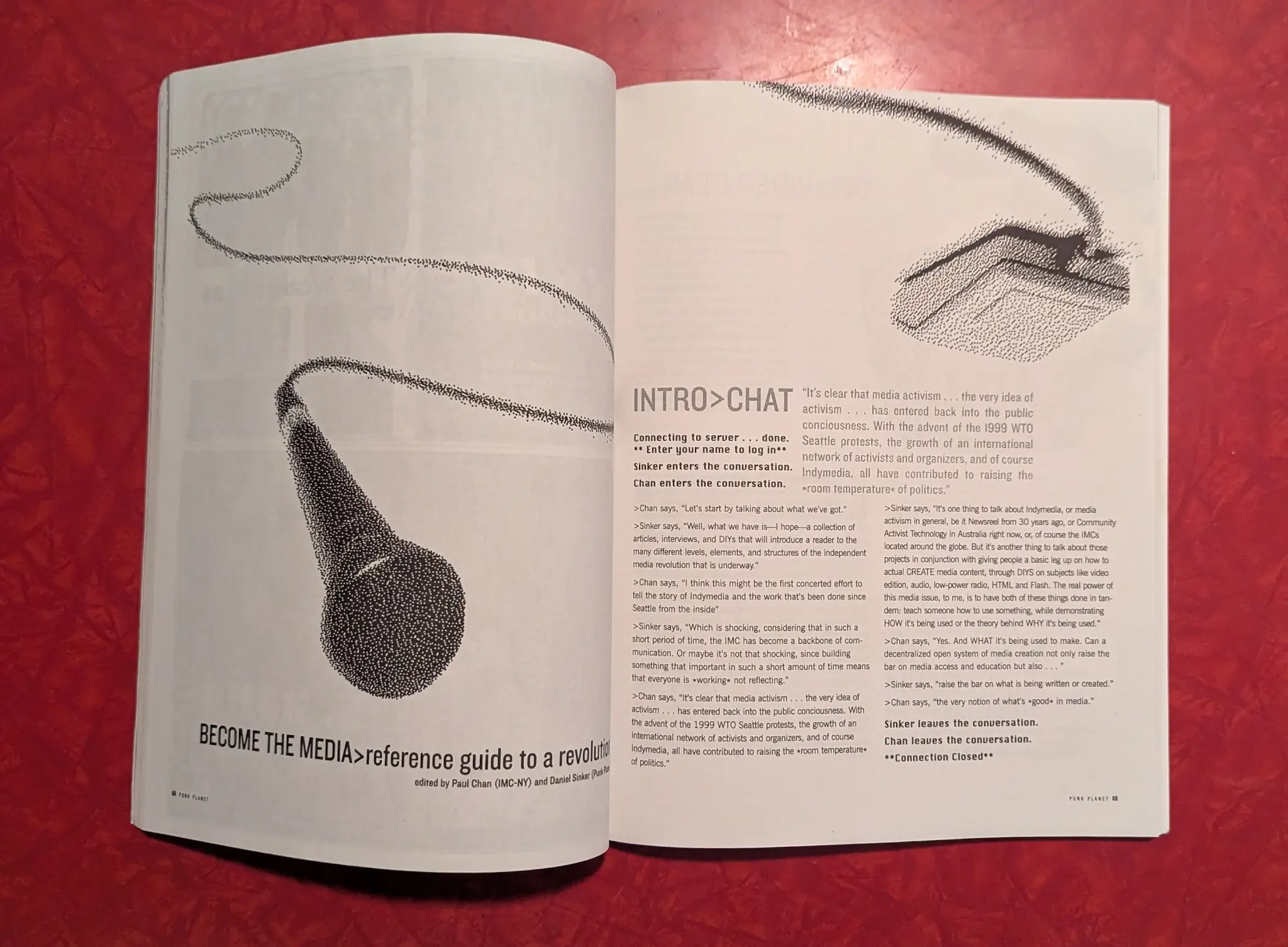
The opening spread of the "Become the Media" section, I love the highly pixelated photos of gear we used and the overall stark, clean design approach.
In the introduction to the section (which I'm going to very lightly paraphrase because it was formatted as a webchat), Chan and I wrote:
The real power of this media issue is to have these things done in tandem: teach someone how to use something, while demonstrating HOW it's being used or the theory behind WHY it's being used and WHAT it's being used to make. Can a decentralized open system of media creation not only raise the bar on media access and education but also raise the bar on what is being written and created while also raising the bar on the very notion of what is good in media?
Looking over years of Punk Planet these last few months, one thing that has struck me over and over is how relevant much of it is to today. But this issue is especially so.
The central question here—can a decentralized, open system not only raise the bar on access but also on what's it's being used to create?—is super relevant RIGHT NOW, as we stand at a moment when traditional media institutions have failed us in yet another election cycle and the social media goliaths that have taken over all aspects of our lives over the last 15 years or so are (at least momentarily) faltering. And, of course, we have a fascist preparing to move into the White House to wage four years of war against the left, against migrants, and against anyone that dares question his absolute authority.
The time is now.
We need more access. We need more media. We need more voices.
And the tools are right there.
Right now we have a moment where two decentralized open systems—Bluesky's AT Protocol and the ActvityPub protocol that drives Mastodon—are succeeding in upending the social media trends of the last few years. One of the biggest sins of the algorithmic social media era was that links—the currency of the web—were downgraded. This is something that started on Instagram, where "link in bio" was the only place you could put a link, but has infected Facebook and Threads and whatever the hell Twitter is now. Even Google's search, which used to pride itself on how fast it could send you back out to the web is in on the act now, clogging its top spots with its own AI slop. Depreciating the link is done to trap people in a platform instead of sending them out to the web. It's the same dark pattern that creates clockless mazes in casinos: engagement goes way up if there's no reason to leave. In the pursuit of profit (and power) these companies destroyed the link and hurt all of us.
On Bluesky and Mastodon the link rides up front: social media becomes a distribution mechanism again and the good old fashioned web becomes newly relevant. Because you can still build anything on the web, host it wherever you want for very little cash (I have not paid for hosting in years), and have it accessible in an instant by anyone, platform agnostic and without mediation.
Looking back on issue 43 of Punk Planet, the relevant technologies we outlined—building on the web and working with video and audio—are easier and cheaper than they were in 2000 by a mile, and still super relevant. And especially when it comes to podcasting, it's still built on a remarkably open protocol that make it so anyone can publish and anyone can listen without proprietary subscriptions or app-specific tech. At the end of every podcast you hear someone say "get it wherever you listen to podcasts" and that is actually a very radical statement in an era where too many things are closed systems.
There's also the ancient (in internet years) open protocol of email, which has been having a renaissance over the last few years through newsletters (of which I've made a few). While making a website can feel hard, writing an email is easy. And there are more places than ever to use to send it out (though I would ask you please to consider not supporting Substack, which platforms the far right and is attempting to corner the newsletter market in a proprietary way that will not end well for open systems). But hell, maybe you don't even want to write emails. Your groupchat is a great way to get the word out. Don't just think of it as sharing the tea, think of it as peer-to-peer information sharing.
But also creating pages on the web itself is still straightforward, especially if you don't worry about a lot of modern bells and whistles. The web used to look like shit, but anyone could build on it. Maybe this is me at my post Pollyannaish, but there's nothing stopping us from getting back to that. The janky web of the past is still right here in the present. Look, let's do it now:
<html>
<head>
<title>Your title for the browser</title>
</head>
<body>
<h1>Your title for real</h1>
<p>Your stuff</p>
</body>
</html>
Copy that code, type whatever you want, save it as a .html file and it'll open in any browser. While it might look like a webpage from 1994, it still totally works in 2024, it will load instantaneously and costs essentially zero dollars to host. The web is still radical. And the web is still easy, even if modern webdev tells you otherwise.
None of this stuff is the exclusive domain of billionares or of established media corporations. It all exists for you too. It's yours to make and to build and, most importantly, to try.
I know this was supposed to be an essay about Punk Planet Year Seven, but "Become the Media" isn't just an old issue, it's a rallying cry for right now. The time to build, the time to create, the time to experiment, the time to find your voice is right now. It's never been easier and it's never been more needed.
Find your voice, find other people's too, amplify them, spread them, and become the media. We need you.
Published November 30, 2024. |
Have new posts sent directly to your email by subscribing to the newsletter version of this blog. No charge, no spam, just good times.
Or you can always subscribe via RSS or follow me on Mastodon or Bluesky where new posts are automatically posted.
Whistle Up 2: Rise of the Whistle Goblins
Today the crew of weirdo printers that I call the whistle goblins passed a half-million whistles printed and shipped. I wrote about how we got there and how you can start printing whistles yourself.
Posted on Feb 8, 2026
Foundational Texts: Jenny Holzer's Truisms
The first installment in the monthly Foundational Texts series looks at artist Jenny Holzer's Truisms, what they meant to a 14-year-old me and how they still resonate today.
Posted on Jan 31, 2026
From Chicago to Minneapolis to wherever is next, more and more it's very clear that we are all we have. And maybe that's enough.
Posted on Jan 21, 2026